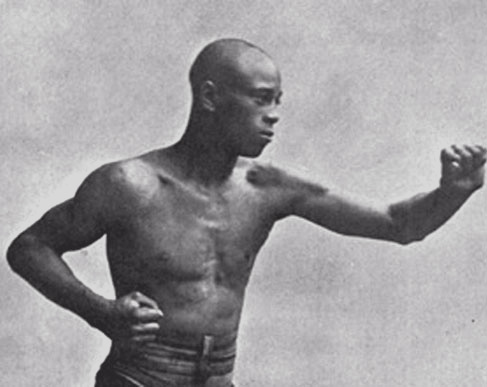"I remember Chappie saying, 'Don't go for the knockout yet. Keep jabbing him off balance so he can't get that right in, and for God's sake keep your left arm high.' I wish I had listened to him." --Joe Louis after his first fight against Schmeling, 1936.

Jack Blackburn...notice scar on left side of face
Born in Versailles, Kentucky in 1883, Charles Henry Blackburn was the son of a minister. He was known as Jack to most and as "Chappie" to his friend Joe Louis. He moved with his family to Terre Haute, Indiana, where he first began boxing. One story suggests that he was hired as a sparring partner for a day and nearly knocked out his opponent. He then headed to Pittsburgh and Philadelphia to continue his ring career. He was quick, had a fine jab, and a powerful left hook, and though he weighed only 135 pounds, often fought much larger men. He made good showings against such greats as Joe Gans and Sam Langford (who outweighed him by 45 pounds), and he gave Philadelphia Jack O'Brien all he could handle in a no-decision bout in 1908.

In January 1909 an argument about his common-law wife escalated into a shooting...he killed three people, including his wife. He was convicted of manslaughter and sentenced to ten to fifteen years in prison. Blackburn, who gave boxing lessons to the warden and his children, was released on good behavior after four years and eight months. The incident left him with an ugly scar down the left side of his face. In his first fight following his incarceration, Blackburn won a decision in six rounds, but age caught up to him.
Sparring in the gym with Jack Johnson, Blackburn managed to give the future heavyweight champion a bloody nose. Although he won much more than he lost, his career as a lightweight was frustrated by his inability to secure a title fight. He retired in his mid-thirties, then made a failed comeback attempt two years later, retiring for good in 1923.
Blackburn finished with a final record of 99-26-19. He later became a trainer, most notably of heavyweight champion Joe Louis, Sammy Mandell and Bud Taylor.

Blackburn at first expressed skepticism about Louis, predicting that a black heavyweight would not have many opportunities. Nevertheless, Blackburn worked tirelessly with Louis, schooling him on every aspect of fighting, such as balance, stepping forward when throwing a punch, and hitting with accuracy. According to Hall of Fame trainer Eddie Futch, Blackburn changed Louis from a "box and move" type to a more aggressive fighter. Though Blackburn was tough on Louis, the two grew close and called each other "Chappie." Louis later said, "Chappie made a fighter out of me. He was my closest friend.".
Blackburn prepared Louis for each of his fights, explaining each opponent's strengths and weaknesses. In his corner, Blackburn would pace the fight, telling Louis when to bide his time and tire the other boxer and when to go for the knockout. Louis learned the fine points of boxing technique -- balance, accuracy, and strategy -- from his trainer. Blackburn also taught Louis the psychological aspects of boxing. Raising a brick at Louis, the fighter naturally ducked. "See what I'm trying to teach you?" Blackburn asked. "Pretend you have a brick in your fist. Naturally the guy's gonna duck, then you hit him with the other hand.".

Despite his success as a trainer, Blackburn continued to drink heavily. And he still carried a gun. Louis remembered a visit to Louisiana when Blackburn brought a gun to the fight. "This is the South," he told Louis. In 1935 Blackburn was arrested again after allegedly shooting at another man following a brawl. Two bystanders, an elderly man and a young girl, were shot; the man died from his injury. Three months before the first Louis-Schmeling fight, Blackburn was found not guilty.
After Schmeling handed Louis his first professional defeat, Blackburn told reporters, " got believin' all you newspaper boys say about him -- that he ain't human. Schmeling learned him something." Privately, he shed tears in Louis' dressing room. Schmeling remembers a visit after the fight: "Jack Blackburn, his face serious, came into the room and elbowed his way over to me. He was very down about his man losing, but he shook my hand and said, 'You were great, Max!'".
Louis eventually won the heavyweight title and defended it successfully twenty times, with Chappie in his corner.Blackburn had problems with drinking and with arthritis during the time he trained Louis. In 1935, he was indicted for perjury and manslaughter in a case that was later dropped. In 1942, Blackburn fell ill and was in the hospital for the twenty-first title defense; his assistant, Mannie Seamon took his place. Not long after that victory, Blackburn died of a heart attack. Louis was devastated: "I guess I thought I'd be heavyweight champion forever and Chappie would always be with me. Chappie had been another father, a teacher, and a friend, so when you think about it, I lost three people, not one." Louis and his wife named their first child -- Jacqueline -- after Chappie Blackburn.

Reference
Jack . (2014). Retrieved on April 27, 2014, from http://www.pbs.org/wgbh/amex/fight/peopleevents/p_blackburn.html.
Jack Blackburn. (2014). Retrieved on April 27, 2014, from http://en.wikipedia.org/wiki/Jack_Blackburn.
Jack Blackburn. (2014). Retrieved on April 27, 2014, from http://www.ibhof.com/pages/about/inductees/nonparticipant/blackburn.html.
PHILLY BOXING HISTORY. (2014). Retrieved on April 27, 2014, from http://www.phillyboxinghistory.com/nonboxers/nonboxer_blackburn.htm.
jackblackburn.html. (2014). Retrieved on April 27, 2014, from http://www.harrygreb.com/jackblackburnbiopage.html.

Comments